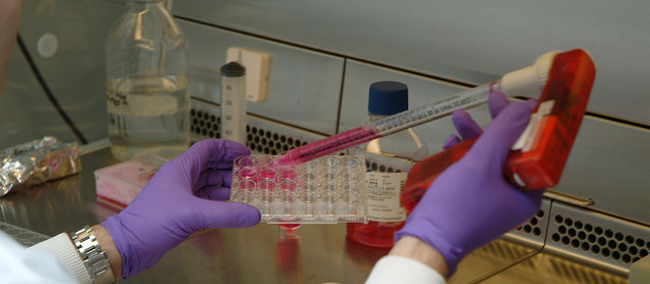The future of synthetic vaccines: combining cutting edge science and global collaboration to protect lives

The University of Bristol will contribute to a new research hub to increase global immunisation coverage and improve the response to viral outbreaks through the rapid and cost-effective deployment of vaccines.
BrisSynBio is working collaboratively to develop the new Future Vaccine Manufacturing Hub, led by Imperial College London and in partnership with four UK universities and 3 institutes.
The challenge
Managed by the Engineering and Physical Sciences Research Council (EPSRC), the Hub will address two major global challenges:
- how to design a vaccine production system that can produce tens of thousands of new doses within weeks of a new threat being identified
- how to improve current manufacturing processes and change the way vaccines are manufactured, stabilised and stored so that existing and new diseases can be prevented effectively, and costs reduced
Currently, nearly one in five infants across the world - 19.5 million children - do not have access to basic vaccines, and almost one third of deaths among children under five could be prevented through the use of vaccines.
The effective distribution of vaccines is hampered in rural areas of low and middle-income nations by the costs associated with production and purification, and the challenge of storage at temperatures between two and eight degrees Celsius.
Adopting a future-thinking approach, there is also the need to respond rapidly to significant emerging threats such as the Ebola and Zika viruses.
The hub will collaborate with the Developing Countries Vaccine Manufacturing Network on manufacturing projects in India, Vietnam, Bangladesh, Uganda and China.
What we’re doing
The new Hub will adopt an integrated approach that will build on new developments in life sciences, immunology and process systems to address the two main challenges.
Researchers at the Hub will explore the development of novel vaccines which can be rapidly manufactured. This will include work on efficient production in yeast and insect cell cultures of synthetic particles that mimic components of infectious pathogens and protein stabilisation strategies to thermo-stabilise vaccines, alleviating dependence on refrigerated distribution and storage which creates major logistic and financial obstacles in developing countries.
How it helps
Bristol lead, Professor Imre Berger, Director of the Bristol Synthetic Biology Centre BrisSynBio, is confident Bristol’s role in this project will be an important contributor to the efforts to innovate global vaccination systems.
“Synthetic biology is emerging as a game-changer in many fields, notably in life sciences and the health sector. BrisSynBio will bring to bear its array of highly sophisticated tools to address urgent, unmet needs in the field of vaccine research.”
By developing improved methods of vaccines production and distribution, the Future Vaccine Manufacturing Hub aims to directly protect some of the poorest and most vulnerable communities in the world from current diseases and future viral outbreaks which could be become large-scale global threats. Ensuring vaccines can be quickly produced, efficiently stock-piled and transported with less cost will benefit the most at-risk communities.
The science explained
RNA vaccines are synthetic chemicals specifically engineered by scientists to allow host cells within the vaccinated individual to express a targeted immune response against a harmful infectious disease and so prevent its effects. They use viral structural proteins but lack viral genetic material, meaning harmful components of the infectious agent cannot be replicated and spread within the individual.
RNA, or ribonucleic acid, is a single-strand, linear molecule made up of a sequence of the four base nucleotides (adenine, guanine, cytosine, uracil), like our DNA.
Vaccine production: By using bacterial, yeast or insect cells as a production factory, scientists are able to harness their natural protein-producing systems to manufacture (in fermenters) new vaccines for global distribution. Current work is focused on improving the efficiency and yields of these production systems.
Protein stabilisation: A common challenge in the distribution of vaccines is the natural degradation of their constituent proteins at room temperature, rendering them dependent on refrigeration for storage and transport all the way to the point of administration (so called ‘cold-chain’). Containment and transport costs and logistics are impacted heavily by this issue. Important work is being done to make vaccines thermally stable using treatments like freeze-drying or encapsulating the compound in sugar glass or organic polymers (a substance with a molecular structure comprised of a large number of similar units bonded together).
Further information
BrisSynBio: BrisSynBio is a multi-disciplinary research centre that focuses on the biomolecular design and engineering aspects of synthetic biology and has been established as one of six Synthetic Biology Research Centres in the UK. BrisSynBio is funded predominantly by the BBSRC and EPSRC and has a number of other academic, industrial and public-facing partners.
BrisSynBio is part of the Bristol BioDesign Institute, one of the University of Bristol's seven Specialist Research Institutes.
Funders
Department of Health funding of £9,947,570 over 40 months has been allocated to the Future Vaccine Manufacturing Hub.
Partner organisations
The Hub is led by Imperial College London, and includes leading teams at the Universities of Bristol, Cambridge and Nottingham, Cranfield University, the Clinical Biotechnology Centre (CBC) as part of NHS Blood and Transplant, UK National Biologics Manufacturing Centre, CPI and National Institute for Biological Standards and Control (NIBSC).
The Hub is partnering with GSK Vaccines Institute for Global Health. The hub will also collaborate with the Developing Countries Vaccine Manufacturing Network (DCVMN) and African Vaccine Manufacturers Initiative (AVMI) to maximise dissemination of knowledge.
Manufacturing research projects will be carried out at location with Hilleman Laboratories, India; the Uganda Virus Research Institute (UVRI); Dalian Hissen BioPharm Co., Ltd, China; Incepta, Bangladesh; and VABIOTECH, Vietnam.
For further information on global immunisation figures visit:
- The World Health Organization’s immunisation coverage page
- Unicef’s immunisation page